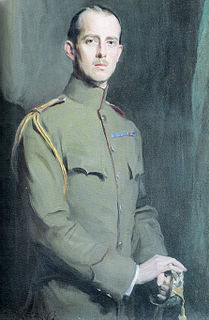 W
WPrince Andrew of Greece and Denmark of the House of Schleswig-Holstein-Sonderburg-Glücksburg, was the seventh child and fourth son of King George I of Greece and Olga Constantinovna of Russia. He was a grandson of Christian IX of Denmark and father of Prince Philip, Duke of Edinburgh. He was from birth a prince of both Denmark and Greece by virtue of his patrilineal descent.
 W
WAristeidis Chasapidis was a Greek army officer who reached the rank of lieutenant general and served as Chief of the Hellenic Army General Staff in 1935–36.
 W
WAnastasios Dalipis, usually referred as Tasos Dalipis, was a Greek Army officer and politician, who was elected many times as a member of the Greek Parliament and served as Minister Governor-General of Western Macedonia from 1946 to 1947.
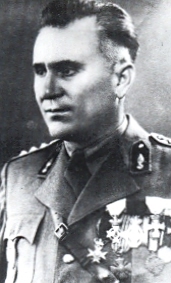 W
WKonstantinos Davakis was a Greek military officer in World War II. He organized the Greek defensive lines during the Battle of Pindus that led to Italian defeat in the first stage of the Greco-Italian War of 1940.
 W
WIoannis Demestichas was a Greek Navy officer. He is best known for his participation in the Macedonian Struggle under the nom de guerre of Kapetan Nikiforos. He held various senior commands in the Greek Navy, including thrice as Chief of the Hellenic Navy General Staff, and also served briefly in cabinet positions.
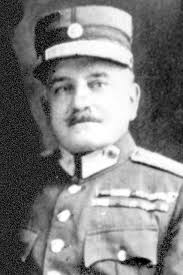 W
WDimosthenis Dialetis was a Greek soldier who rose to the rank of Lieutenant General.
 W
WKimon Digenis (1871–1945) was a Greek Army officer who reached the rank of Major General.
 W
WSofoklis Dousmanis was a Greek naval officer. Distinguished in the Balkan Wars, he became twice the chief of the Greek Navy General Staff, and occupied the post of Minister for Naval Affairs in 1935.
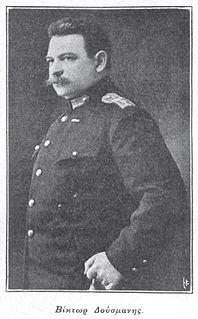 W
WViktor Dousmanis was a Greek military officer, who rose to the rank of Lieutenant General. He distinguished himself as a staff officer during the Balkan Wars and became a leading royalist during the National Schism, serving three terms as Chief of the Hellenic Army General Staff.
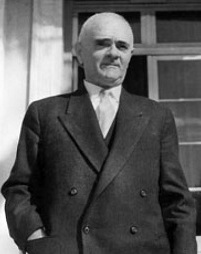 W
WKonstantinos Dovas was a Greek general and interim Prime Minister.
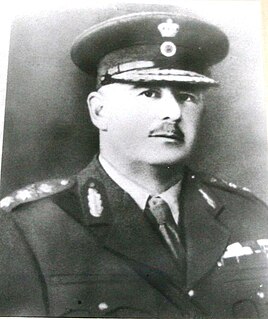 W
WMarkos Drakos was a Lieutenant General of the Hellenic Army most notable for his leadership during the Greco-Italian War of 1940–41, as commander of the Eastern Macedonia Army Section and of the Epirus Army Section.
 W
WAthanasios Frangou or Frangos was a Greek Army officer who reached the rank of Major General.
 W
WMordechai Frizis was a Greek military officer, who fought in World War I, distinguished himself in World War II, and was killed on 5 December 1940, fighting against the Julia Division.
 W
WPanagiotis Gargalidis was a Greek army general who fought in the Greco-Turkish War of 1897, the Balkan Wars, World War I, and the Asia Minor Campaign, and leader of a failed coup attempt in 1923.
 W
WStylianos Gonatas was a Greek military officer and Venizelist politician and Prime Minister of Greece between 1922 and 1924.
 W
WGeorgios Hatzianestis was a Greek artillery and general staff officer who rose to the rank of lieutenant general. He is best known as the commander-in-chief of the Army of Asia Minor at the time of the Turkish August 1922 offensive, which he failed to stop. Relieved, he was later tried and condemned in the Trial of the Six as one of the main culprits of the Greek defeat in the Asia Minor Campaign, and executed.
 W
WAlexandros Hatzikyriakos was a Greek Navy officer who rose to the rank of rear admiral. He played a major role in the establishment of the Second Hellenic Republic in 1924, and served thrice as Minister for Naval Affairs and two brief periods as Foreign Minister.
 W
WChristos Hatzipetros was a Greek artillery officer who rose to the rank of Major General.
 W
WDimitrios Ioannou was a senior Greek Army officer who fought in the Macedonian front during World War I and in the opening stages of the Greco-Turkish War of 1919–1922.
 W
WIgnatios Kallergis was an officer of the Greek Army. He reached the rank of major general, participating in the Balkan Wars, the Allied intervention in Southern Russia and the Asia Minor Campaign. He played an important role in Greek Armed Forces in the Middle East. He took part in nine crucial battles and was honored with almost every Greek medal for valour. He married Elpida Karimali and had two children, Elizabeth and Konstantinos ..
 W
WIoannis Kalogeras was a Greek army officer and politician.
 W
WGeorgios Katechakis was a Greek Army officer and politician. He distinguished himself with his participation in the Macedonian Struggle under the nom de guerre Kapetan Rouvas in 1904–1905. An ardent Venizelist, he participated in the Movement of National Defence. After his retirement from the army with the rank of Major General, he entered politics, being elected into the Greek Parliament and the Greek Senate. He also served three times as Minister for Military Affairs and as Governor-General for Thrace (1922–1923) and for Crete (1928–1930).
 W
WDimitrios Katheniotis was a Greek Army officer who rose to the rank of lieutenant general and served as chief of the Hellenic Army General Staff in 1933–35.
 W
WGeorgios Kondylis was a general of the Greek army and Prime Minister of Greece. He was nicknamed Keravnos, Greek for "Thunder" or "Thunderbolt".
 W
WAlexandros Kontoulis was a Greek Army officer who rose to the rank of Lieutenant General. He was among the driving minds behind the Macedonian Struggle and was involved in the Albanian national movement, with the nom de guerre of Kapetan Skourtis. Kontoulis fought with distinction in the Greco-Turkish War of 1897 and the First Balkan War, where he was heavily wounded. In the Greco-Turkish War of 1919–1922, he commanded the I Army Corps on the southern sector of the Greek front from February 1921 to June 1922. After his retirement, he served as ambassador to Albania.
 W
WGeorgios Kosmas was a senior Greek Army officer who distinguished himself in the Greco-Italian War of 1940–1941, served as Chief of the Hellenic Army General Staff in 1949–51, and became a Member of the Hellenic Parliament and cabinet minister.
 W
WEvangelos Koukoudeas was a Greek chieftain of the Macedonian Struggle and hero of the Balkan Wars.
 W
WGeorgios Leonardopoulos was a Greek army major general who fought in the Greco-Turkish War of 1897, the Balkan Wars, World War I, and the Greco-Turkish War of 1919–1922, and leader of a failed coup attempt in 1923.
 W
WKonstantinos Manetas was a Greek Army officer who rose to the rank of lieutenant general and served as Chief of the Hellenic Army General Staff in 1931. He also served four times in ministerial positions and was elected to parliament in 1950.
 W
WAlexandros Mazarakis-Ainian was a Greek Army officer who rose to the rank of lieutenant general. He served thrice as Chief of the Hellenic Army General Staff, occupied various important ministerial positions and became president of the Academy of Athens.
 W
WKonstantinos Mazarakis-Ainian was a Greek Army officer who rose to the rank of Lieutenant General.
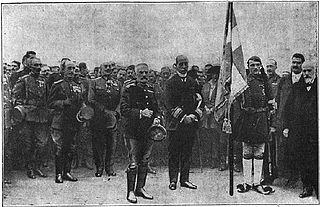 W
WKonstantinos Miliotis-Komninos was a Greek Army officer who rose to the rank of Lieutenant General. He was also an amateur swordsman, competing in the 1896 Athens Olympics. He also served in the Organizing Committee for the 1906 Intercalated Games.
 W
WEfstratios Stamatopoulos was a Greek writer. He is known for writing novels, novellas, and short stories under the pseudonym Stratis Myrivilis. He is associated with the "Generation of the '30s". He was nominated for the Nobel Prize in Literature three times.
 W
WKonstantinos Nider was a Greek Army officer, who rose to the rank of lieutenant general and distinguished himself during the First World War and the subsequent Asia Minor Campaign.
 W
WAlexandros Othonaios was a distinguished Greek general, who became briefly the acting Prime Minister of Greece, heading an emergency government during an abortive coup in 1933.
 W
WLieutenant General Theodoros Pangalos was a Greek general, politician and dictator. A distinguished staff officer and an ardent Venizelist and anti-royalist, Pangalos played a leading role in the September 1922 revolt that deposed King Constantine I and in the establishment of the Second Hellenic Republic. In June 1925 Pangalos staged a bloodless coup, and his assumption of power was recognized by the National Assembly which named him Prime Minister. As a "constitutional dictator" he ruled the country until his overthrow in August 1926. From April 1926 until his deposition, he also occupied the office of President of the Republic.
 W
WAlexandros Papagos was a Greek Army officer who led the Hellenic Army in World War II and the later stages of the Greek Civil War. The only Greek career officer to be raised to the rank of Field Marshal, he became the first Chief of the Hellenic National Defence General Staff from 1950 until his resignation in 1951. He then entered politics, founding the Greek Rally party and becoming the country's Prime Minister after his victory in the 1952 elections. His premiership was defined by several events. The Cold War, and the aftermath of the Greek Civil War; Greece becoming a member of NATO; American military bases were allowed on Greek territory; a powerful and vehemently anti-communist security apparatus was created; and the communist leader Nikos Ploumpidis was executed by firing squad. His tenure also saw the start of the Greek economic miracle, and rising tensions with Britain and Turkey over the Cyprus issue.
 W
WAnastasios Papoulas was a Greek general, most notable as the Greek commander-in-chief during most of the Greco-Turkish War of 1919–22. Originally a firm royalist, after 1922 he shifted towards the republican Venizelists, and was executed in 1935 for supporting a failed republican coup.
 W
WLeonidas Paraskevopoulos was a senior Greek military officer and politician. He played a major role in Greece's war effort during World War I, and was the commander-in-chief of the Greek Army of Asia Minor in 1919–20. In later life he was a member of the Greek Senate and served as its speaker in 1930–32.
 W
WNikolaos Plastiras was a Greek general and politician, who served thrice as Prime Minister of Greece. A distinguished soldier known for his personal bravery, he became famous as "The Black Rider" during the Greco-Turkish War of 1919–1922, where he commanded the 5/42 Evzone Regiment. After the Greek defeat in the war, along with other Venizelist officers he launched the 11 September 1922 Revolution that deposed King Constantine I of Greece and his government. The military-led government ruled until January 1924, when power was handed over to an elected National Assembly, which later declared the Second Hellenic Republic. In the interwar period, Plastiras remained a devoted Venizelist and republican. Trying to avert the rise of the royalist People's Party and the restoration of the monarchy, he led two coup attempts in 1933 and 1935, both of which failed, forcing him to exile in France.
 W
WAndreas Platis was a Greek Army officer who reached the rank of lieutenant general.
 W
WGeorgios Polymenakos was a Greek Army officer who reached the rank of lieutenant general.
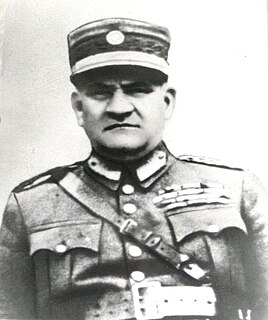 W
WAchilleas Protosyngelos was a Hellenic Army officer who fought in the Balkan Wars, World War I, the Asia Minor Campaign, and reached the rank of Lieutenant General.
 W
WDimitrios Psarros was a Greek army officer, founder and leader of the resistance group National and Social Liberation (EKKA), the third-most significant organization of the Greek Resistance movement after the National Liberation Front (EAM) and the National Republican Greek League (EDES).
 W
WAlexandros Pilatos Sakellariou was a Greek admiral and politician, who led the Royal Hellenic Navy in World War II.
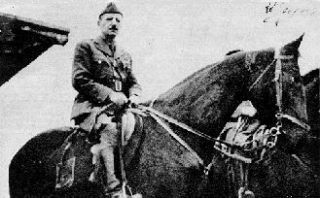 W
WStefanos Sarafis was an officer of the Hellenic Army who played an important role during the Greek Resistance.
 W
WPtolemaios Sarigiannis was a Greek Army officer who rose to the rank of Major General, holding senior staff positions during the Greco-Turkish War of 1919–1922 and serving as Chief of the Hellenic Army General Staff in 1925–1926.
 W
WPetros Soumilas or Soumilis was a Greek Army officer who reached the rank of lieutenant general.
 W
WXenophon Stratigos was a senior Greek Army staff officer who played a major role in the Balkan Wars of 1912–13 and the Asia Minor Campaign in 1921–22, serving also as de facto Chief of the Hellenic Army General Staff in 1916–17 and in 1921. He retired from the army in September 1921 and served as Minister for Transport in 1922. Condemned to life imprisonment at the Trial of the Six, he was later pardoned and left for Switzerland, where he lived until his death.
 W
WNikolaos Trikoupis was a Greek general and politician, most notable for his service in the Greco-Turkish War of 1919–1922, where he was taken as a prisoner of war. He also participated in the 1896 Summer Olympics, where he came third at the military rifle.
 W
WThrasyvoulos Tsakalotos was a distinguished Greek army Lieutenant General who served in World War I, the Greco-Turkish War of 1919–1922, World War II and the Greek Civil War, rising to become Chief of the Hellenic Army General Staff. He also served as Greece's Ambassador to Yugoslavia.
 W
WNikolaos Tsipouras was a Hellenic Army officer who fought in the Macedonian Struggle, the Balkan Wars, the struggle for Northern Epirote autonomy, World War I and the Asia Minor Campaign, retiring as a major general.
 W
WVlasios Tsirogiannis was a Hellenic Army officer who rose to the rank of Lieutenant General.
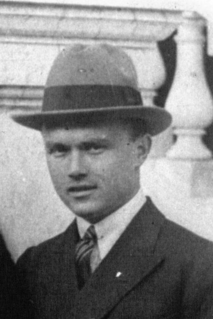 W
WSofoklis Venizelos was a Greek politician, who three times served as Prime Minister of Greece – in 1944, 1950 and 1950–1951.
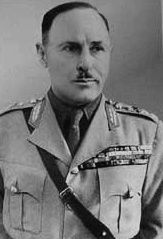 W
WKonstantinos Ventiris was a Greek Army officer who rose to the rank of lieutenant general. He served twice as Chief of the Hellenic Army General Staff and was one of the senior government commanders during the Greek Civil War. He is also one of the few recipients the country's highest wartime decoration, the Commander's Cross of the Cross of Valour.
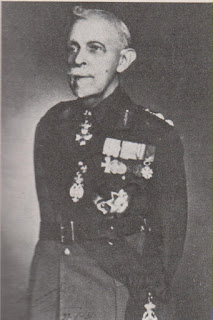 W
WAristotelis Vlachopoulos was a Greek Army officer who rose to the rank of lieutenant general and served as Chief of the Hellenic Army General Staff in 1920–21.
 W
WEmmanouil Zymvrakakis was a Greek army officer who rose to the rank of Lieutenant General, and was distinguished in World War I.